| Listing 1 - 10 of 54 | << page >> |
Sort by
|
Book
Year: 2011 Publisher: Wicken : The Professional and Higher Partnership Ltd,
Abstract | Keywords | Export | Availability | Bookmark
 Loading...
Loading...Choose an application
- Reference Manager
- EndNote
- RefWorks (Direct export to RefWorks)
In this passionate, iconoclastic, survey of Creative Writing as an academic discipline, Stephanie Vanderslice provides a provocative critique of existing practice. She challenges enduring myths surrounding creative writing - not least, that writers learn most from workshops. Through case studies of best practice from America and elsewhere, Vanderslice provides a vision of change, showing how undergraduate and postgraduate programs can be reformed to re-engage with contemporary culture.
Book
ISBN: 9783110266368 3110266369 Year: 2012 Volume: 196 Publisher: Berlin ; Boston De Gruyter
Abstract | Keywords | Export | Availability | Bookmark
 Loading...
Loading...Choose an application
- Reference Manager
- EndNote
- RefWorks (Direct export to RefWorks)
Expression --- English language --- Gender identity --- Conversation --- Rhetoric --- Study and teaching --- Social aspects --- English language - Rhetoric - Study and teaching - Social aspects
Book
ISBN: 0521767466 9780521767460 9781009030199 9780521149594 1009030191 0521149592 Year: 2012 Publisher: Cambridge Cambridge University Press
Abstract | Keywords | Export | Availability | Bookmark
 Loading...
Loading...Choose an application
- Reference Manager
- EndNote
- RefWorks (Direct export to RefWorks)
Genres across the Disciplines presents cutting edge, corpus-based research into student writing in higher education. Genres across the Disciplines is essential reading for those involved in syllabus and materials design for the development of writing in higher education, as well as for those investigating EAP. The book explores creativity and the use of metaphor as students work towards becoming experts in the genres of their discipline. Grounded in the British Academic Written English (BAWE) corpus, the text is rich with authentic examples of assignment tasks, macrostructures, concordances and keywords. Also available separately as a paperback.
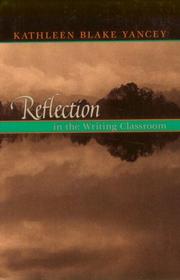
ISBN: 0874213142 058502765X 0874212383 9780874213140 9780585027654 9780874212389 Year: 1998 Publisher: Logan, Utah Utah State University Press
Abstract | Keywords | Export | Availability | Bookmark
 Loading...
Loading...Choose an application
- Reference Manager
- EndNote
- RefWorks (Direct export to RefWorks)
Yancey explores reflection as a promising body of practice and inquiry in the writing classroom. Yancey develops a line of research based on concepts of philosopher Donald Schon and others involving the role of deliberative reflection in classroom contexts. Developing the concepts of reflection-in-action, constructive reflection, and reflection-in-presentation, she offers a structure for discussing how reflection operates as students compose individual pieces of writing, as they progress through successive writings, and as they deliberately review a compiled body of their work-
English language - Rhetoric - Study and teaching. --- English language -- Rhetoric -- Study and teaching. --- Report writing - Study and teaching. --- Report writing -- Study and teaching. --- English language --- Report writing --- Reflection (Philosophy) --- English Language --- English --- Languages & Literatures --- Study and teaching --- Rhetoric --- Study and teaching. --- Philosophy --- Germanic languages
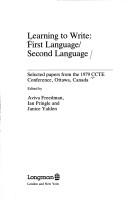
ISBN: 0582553717 9780582553712 Year: 1989 Publisher: London Longman
Abstract | Keywords | Export | Availability | Bookmark
 Loading...
Loading...Choose an application
- Reference Manager
- EndNote
- RefWorks (Direct export to RefWorks)
English language --- -Germanic languages --- Rhetoric --- -Study and teaching --- -Case studies --- Report writing --- Study and teaching --- Foreign speakers --- Foreign speakers. --- Research paper writing --- Research report writing --- Term paper writing --- Authorship --- Germanic languages --- Rhetoric&delete& --- Study and teaching&delete& --- English language - Rhetoric - Study and teaching - Canada --- English language - Rhetoric - Study and teaching - Foreign speakers --- Report writing - Study and teaching - Canada
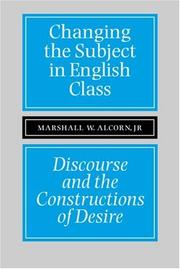
ISBN: 1429417412 9781429417419 080932427X 9780809324279 0809324202 9780809324200 Year: 2002 Publisher: Carbondale Southern Illinois University Press
Abstract | Keywords | Export | Availability | Bookmark
 Loading...
Loading...Choose an application
- Reference Manager
- EndNote
- RefWorks (Direct export to RefWorks)
Drawing on the theoretical work of Jacques Lacan, Marshall W. Alcorn Jr. formulates a systematic explanation of the function and value of desire in writing instruction. Alcorn argues that in changing the subject matter of writing instruction in order to change student opinions, composition instructors have come to adopt an insufficiently complex understanding of subjectivity. This oversimplification hinders attempts to foster cultural change. Alcorn proposes an alternative mode of instruction that makes effective use of students' knowledge and desire. The resulting freedom in expression - personal as well as political - engenders the recognition, circulation, and elaboration of desire necessary for both human communication and effective politics. Responding to James Berlin's reconception of praxis in the classroom, Theresa Ebert's espousal of disciplined instructions, and Lester Faigley's introduction of a postmodern theory of subjectivity, Alcorn follows both Lacan and Slavoj Žižek in insisting desire be given free voice and serious recognition. In composition as in politics, desire is the ground of agency. Competing expressions of desire should generate a dialectic in social-epistemic discourse that encourages enlightenment over cynicism and social development over authoritarian demands. With clarity and personal voice, Alcorn explains how discourse is rooted in primitive psychological functions of desire and responds to complex cultural needs. In its theoretical scope this book describes a new pedagogy that links thought to emotion and the personal to the social.
English language --- English philology --- Language and culture --- Report writing --- Culture --- Rhetoric and psychology --- English --- Languages & Literatures --- English Language --- Psychology and rhetoric --- Rhetoric --- Literature --- Psychology --- Cultural sociology --- Sociology of culture --- Civilization --- Popular culture --- Culture and language --- Germanic languages --- Study and teaching --- Psychological aspects --- Political aspects --- Study and teaching (Higher) --- History --- Discourse analysis --- Social aspects --- English language - Rhetoric - Study and teaching - United States --- English language - Rhetoric - Study and teaching - Psychological aspects --- English language - Rhetoric - Study and teaching - Political aspects --- English philology - Study and teaching (Higher) - United States --- Language and culture - United States - History - 20th century --- Report writing - Study and teaching (Higher) - United States --- Culture - Study and teaching (Higher) - United States --- English language - Discourse analysis
Book
ISBN: 0415062624 9780415062626 Year: 1992 Publisher: London New York Routledge
Abstract | Keywords | Export | Availability | Bookmark
 Loading...
Loading...Choose an application
- Reference Manager
- EndNote
- RefWorks (Direct export to RefWorks)
English language --- Report writing --- Rhetoric --- Study and teaching. --- Lerarenopleiding --- (vak)didactiek talen --- (vak)didactiek talen. --- Study and teaching --- English philology --- English language - Rhetoric - Study and teaching. --- English philology - Study and teaching. --- Report writing - Study and teaching.
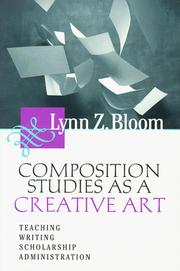
ISBN: 0874213630 0585028419 0874212464 9780874213638 9780585028415 9780874212464 Year: 1998 Publisher: Logan, Utah Utah State University Press
Abstract | Keywords | Export | Availability | Bookmark
 Loading...
Loading...Choose an application
- Reference Manager
- EndNote
- RefWorks (Direct export to RefWorks)
Bloom gathers twenty of her most recent essays (some previously unpublished) on critical issues in teaching writing. She addresses matters of philosophy and pedagogy, class and marginality and gender, and textual terror transformed to textual power. Yet the body of her work and this representative collection of it remains centered, coherent, and personal.This work focuses on the creative dynamics that arise from the interrelation of writing, teaching writing, and ways of reading-and the scholarship and administrative issues engendered by it. To regard composition studies as a creative art is t
English language -- Composition and exercises. --- English language -- Rhetoric -- Study and teaching. --- English language. --- English language --- Creative writing --- English --- Languages & Literatures --- English Language --- Study and teaching --- Rhetoric --- Composition and exercises --- Study and teaching. --- Composition and exercises. --- Exercises --- Germanic languages
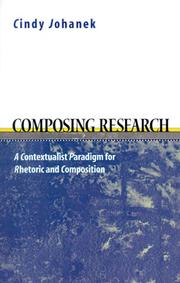
ISBN: 1283266792 9786613266798 0874213223 0874212928 9780874213225 9781283266796 9780874212921 Year: 2000 Publisher: Logan, Utah : Utah State University Press,
Abstract | Keywords | Export | Availability | Bookmark
 Loading...
Loading...Choose an application
- Reference Manager
- EndNote
- RefWorks (Direct export to RefWorks)
Cindy Johanek offers a new perspective on the ideological conflict between qualitative and quantitative research approaches, and the theories of knowledge that inform them. With a paradigm that is sensitive to the context of one's research questions, she argues, scholars can develop less dichotomous forms that invoke the strengths of both research traditions. Context-oriented approaches can lift the narrative from beneath the numbers in an experimental study, for example, or bring the useful clarity of numbers to an ethnographic study. A pragmatic scholar, Johanek moves easily
Composition and exercises. --- English language - Composition and exercises - Research. --- English language - Rhetoric - Study and teaching - Research. --- English language. --- Research. --- Rhetoric. --- Study and teaching. --- English language --- English --- Languages & Literatures --- English Language --- Research --- Rhetoric --- Study and teaching --- Composition and exercises --- Germanic languages
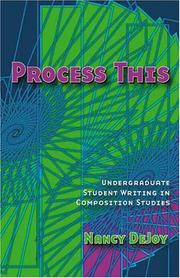
ISBN: 1283283352 9786613283351 087421503X 0874215951 9780874215038 9780874215953 9781283283359 Year: 2004 Publisher: Logan Utah State University Press
Abstract | Keywords | Export | Availability | Bookmark
 Loading...
Loading...Choose an application
- Reference Manager
- EndNote
- RefWorks (Direct export to RefWorks)
In Process This, Nancy DeJoy argues that even recent revisions to composition studies, cultural studies, service learning, and social process movements--continue to repress the subjects and methodologies that should be central, especially at the level of classroom practice. Designed to move student discourses beyond the classroom, these approaches nonetheless continue to position composition students (and teachers) as mere consumers of the discipline. This means that the subjects, methodologies, and theory/practice relationships that define the field are often absent in composition cla
English language - Rhetoric - Study and teaching. --- English language. --- Report writing - Study and teaching (Higher). --- English language --- Report writing --- English --- Languages & Literatures --- English Language --- Rhetoric --- Study and teaching --- Study and teaching (Higher) --- Study and teaching. --- Germanic languages
| Listing 1 - 10 of 54 | << page >> |
Sort by
|

 Search
Search Feedback
Feedback About UniCat
About UniCat  Help
Help News
News